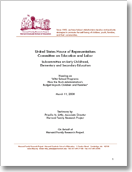The Harvard Family Research Project separated from the Harvard Graduate School of Education to become the Global Family Research Project as of January 1, 2017. It is no longer affiliated with Harvard University.

|
March 11, 2008 Testimony by Priscilla Little at the Hearing on "After School Programs: How the Bush Administration's Budget Impacts Children and Families"Priscilla M. Little |
Article Information
- Full Text (HTML)
- Full Text (PDF: 68 kb)
Priscilla Little, associate director of the Harvard Family Research Project (HFRP), testified at the Early Childhood, Elementary, and Secondary Education Subcommittee Hearing, “After School Programs: How the Bush Administration's Budget Impacts Children and Families” for the United States House of Representatives Committee on Education and Labor on March 11.
An expert in the field of out-of-school time (OST), Little was one of four witnesses invited to testify. Chaired by U.S. Representative Dale Kildee (D-MI), the hearing examined the potential effects of President Bush's plan to slash by 26 percent, or $281 million, funding for the 21st Century Community Learning Centers (21st CCLC)—the federally supported after school program that provides services to more than 1.5 million children and their families.
Little began her testimony with “a very simple message: After school programs are a critical component of children's education and development and, in part thanks to the 21st CCLC grants program, we have a good solid evidence base to support this claim.” The 21st CCLC grants program has provided new money for programs and studies that Little has tracked for more than ten years.
Little speaks nationally on research and evaluation of after school programs, and how best to use this research for policy and practice. She is uniquely positioned to provide insight for effective policies to support children's learning, drawing from over a decade of work at HFRP devoted to building the knowledge base for successful OST initiatives.
HFRP's mission in OST is to promote the strategic use of information to improve the quality, accessibility, and sustainability of OST programs across the nation. This work includes compiling the only national database of OST evaluations and research studies, and disseminating accessible publications to help policymakers and practitioners understand what these studies tell us about effective programming.
In her testimony, Little referred to studies that demonstrate how quality after school programs improve academic, social and emotional outcomes, especially for low-income children. “It is important to note that the common thread among all these studies is not just that the programs intentionally tried to improve academic performance and therefore offered academic support, but that they combined it with other enrichment activities to achieve positive academic outcomes,” she said.
But, Little notes, to succeed in a competitive global economy young people must “be equipped with a set of skills that goes beyond the 3 R's…they need to become effective communicators, know how to develop and sustain relationships, solve problems, and have a strong sense of self. [The research offers] solid evidence that 21st CCLC and other after school programs can support a range” of these desirable behavioral outcomes.
Little's latest publication is an issue brief entitled After School Programs in the 21st Century: Their Potential and What it Takes to Achieve It. The brief draws on seminal research and evaluation studies to address the evolving role of after school.
- Watch the video of Little's testimony
- Read After School Programs in the 21st Century: Their Potential and What it Takes to Achieve It
- Browse HFRP's OST Program Research and Evaluation Database
Free. Available online only.
